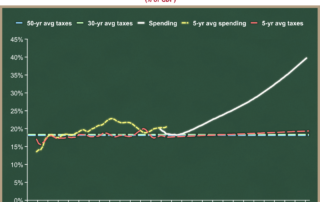How to measure health care cost control
I want to propose a four-part test for measuring any particular bill on health care cost control.
|
short run |
long run |
|
| Federal deficit |
1 |
2 |
| Government health care spending |
X |
3 |
| Private health care spending |
X |
4 |
In each case, I will define the test so that “yes” is a good outcome:
Test 1: The bill does not increase the federal deficit in the short run.
Test 2: The bill significantly reduces the federal deficit in the long run.
Test 3: The bill significantly slows the growth of government health care spending in the long run.
Test 4: The bill significantly slows the growth of private health care spending in the long run.
I believe our Nation’s long-term fiscal problems, and the problems resulting from the growth of per capita health care spending, are higher priorities to solve than reducing the number of uninsured Americans now. I would rather solve America’s health care cost problems of the future than expand government now. This is my value choice. I expect and accept that others will disagree.
As a result of this value choice, I believe any bill that fails any one of these four tests is fiscally and economically irresponsible, and therefore worth defeating.
There does not have to be a tradeoff. A bill could go after the core policy drivers of health care cost growth, especially the tax exclusion for employer-provided health insurance, and replace it with incentives for individuals to shop for high-value health insurance and high-value health care. Such a bill could meet all of the above tests and significantly reduce the number of uninsured. I will describe such a bill in a future post. Such a bill is not going to be passed by this Congress.
I think the administration would agree with my test. They might define Test 3 to be a subset of Test 2. I think it’s important analytically to separate the two.
In practice the test gets slightly more complex. Test 1, “The bill does not increase the federal deficit in the short run,” breaks down into (1A) “over the next five years” and (1B) “over the next ten years.” The Congressional budget rules require that a bill not increase the federal deficit over the next five years. To his credit, the President and his advisors have also been emphasizing that it is important to meet the same test over the next ten years. […]
